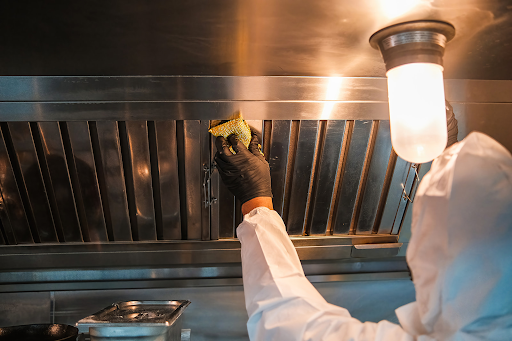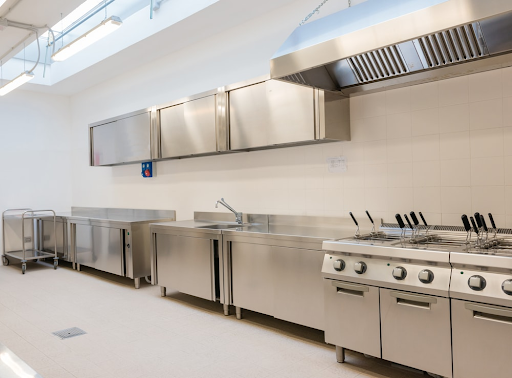Commercial Exhaust Hood Cleaning: Essential Best Practices
In any commercial kitchen, safety is paramount. One critical aspect of maintaining a safe kitchen environment is the regular cleaning of exhaust hoods. These hoods play an essential role in removing smoke, heat, and cooking odors, but they can also accumulate grease and grime over time. Without proper maintenance, dirty exhaust hoods can lead to fire hazards, poor air quality, and health risks. Understanding the importance of commercial exhaust hood cleaning and following best practices is essential for any kitchen operation.
What is Commercial Exhaust Hood Cleaning?
Commercial exhaust hood cleaning involves the systematic removal of grease, dirt, and other contaminants from kitchen exhaust systems. This process is vital for ensuring that exhaust systems function efficiently and safely.
Importance of Commercial Exhaust Hood Cleaning
The significance of regular exhaust hood cleaning cannot be overstated. Accumulated grease can be a significant fire hazard, as it can ignite easily, especially near cooking equipment. Maintaining good air quality is also critical, as cooking produces smoke and fumes that can affect the health of kitchen staff and patrons. Adhering to health regulations is another crucial aspect of this practice. Local health departments often require that kitchens maintain clean exhaust systems to comply with safety standards, making regular cleaning a necessity for compliance and operational integrity.
Overview of the Cleaning Process
The cleaning process typically includes various methods and equipment designed to ensure that every part of the exhaust system is thoroughly cleaned. Professional services often employ high-powered vacuums, steam cleaners, and specialized chemicals to dissolve grease and grime. A comprehensive cleaning service will also inspect ductwork and fans for any potential issues. Implementing a well-defined cleaning process is essential to achieving optimal results and ensuring kitchen safety.
Best Practices for Effective Commercial Exhaust Hood Cleaning
To keep your kitchen safe and compliant, it's essential to follow best practices for exhaust hood cleaning. Regular maintenance and timely inspections can help prevent dangerous situations and improve the air quality in your kitchen.
Regular Cleaning Schedule Recommendations
Establishing a regular cleaning schedule is crucial for maintaining a safe kitchen environment. The frequency of cleaning can depend on various factors, including kitchen operations, types of food prepared, and local regulations.
- Cleaning Frequency: Kitchens that operate daily or prepare greasy foods may require cleaning every month, while less frequently used kitchens could schedule cleanings every three months.
- Maintenance Checklist: Create a maintenance checklist to track when cleanings occur and the condition of the exhaust system. Regular inspections can help identify any buildup before it becomes a more significant issue, contributing to overall kitchen safety.
DIY vs. Professional Cleaning Services
While some may consider DIY cleaning as a cost-effective solution, the benefits of hiring professional cleaning services often outweigh the risks involved in attempting to clean exhaust hoods independently.
- Cost-effective Solutions: While DIY cleaning can save money initially, it may lead to more significant expenses down the line if not performed correctly. Professional services not only save time but also ensure thorough cleaning using specialized equipment and expertise.
- Professional Benefits: Professionals understand the safety standards required for exhaust hood cleaning. They can identify potential hazards that may go unnoticed during a DIY job. Hiring professionals also means ensuring compliance with local health regulations, which can help avoid fines and shutdowns.
Understanding the Risks of Neglecting Exhaust Hood Cleaning
Neglecting exhaust hood cleaning can have severe consequences. Understanding these risks is crucial for any kitchen operation.
Fire Hazards Linked to Dirty Exhaust Hoods
Dirty exhaust hoods pose a significant fire hazard.
- Grease Buildup: Over time, grease can accumulate on surfaces within the exhaust system, creating an ideal environment for fires to ignite. Ignition sources, such as flames from stovetops or grills, can easily set off a fire if they come into contact with this buildup.
- Risk Assessment: Regular cleaning and inspections allow kitchen staff to assess risks and take preventive measures. This includes ensuring that fire suppression systems are in good working order and that all cleaning protocols are being followed diligently.
Health Risks from Poor Air Quality
Another risk of neglecting exhaust hood cleaning is poor air quality.
- Respiratory Issues: Accumulated grease and food particles can lead to smoke and unpleasant odors, negatively impacting the air quality in the kitchen. This can lead to respiratory issues among kitchen staff, which can decrease productivity and morale.
- Food Safety: Poor air quality can also affect food safety, as contaminants can settle on surfaces and food products. Maintaining a clean environment helps ensure the safety and quality of the food being prepared.
Choosing the Right Commercial Exhaust Hood Cleaning Service
Finding the right commercial exhaust hood cleaning service is essential for maintaining kitchen safety and compliance.
What to Look for in a Cleaning Company
When selecting a cleaning company, several factors should be considered:
- Certifications: Ensure that the cleaning service has the necessary certifications and licenses to perform exhaust hood cleaning. This guarantees they meet industry standards and local regulations.
- Experience: Look for companies with a proven track record in commercial kitchen cleaning. Experienced professionals are more likely to understand the complexities of different kitchen setups and tailor their services accordingly.
- Customer Reviews: Check customer reviews and testimonials to gauge the reliability and effectiveness of the cleaning service. Positive feedback from other commercial kitchens can indicate quality service and satisfaction.
Questions to Ask Before Hiring a Service
Before committing to a cleaning service, asking the right questions can help ensure you make an informed decision.
- Pricing: Inquire about pricing structures and any additional costs that may arise during the cleaning process. Transparent pricing helps avoid unexpected expenses.
- Cleaning Methods: Ask about the cleaning methods and equipment used. A reputable company will be able to explain their processes and how it ensures a thorough clean.
- Warranty and Guarantees: Understand what warranties or guarantees the cleaning service offers. A reliable company should provide assurance of their work and offer follow-up services if necessary.
Conclusion
Regular commercial exhaust hood cleaning is crucial for maintaining a safe, compliant kitchen environment. By understanding the importance of proper cleaning practices and adhering to local regulations, kitchen operators can prevent fire hazards and promote better air quality. Prioritizing the maintenance of exhaust hoods not only safeguards employees but also enhances the overall efficiency of kitchen operations.
Don’t compromise on kitchen safety! Schedule your commercial exhaust hood cleaning today with our expert services and ensure a safe, compliant kitchen environment.
Contact us now!
FAQs about Commercial Exhaust Hood Cleaning
How often should commercial exhaust hoods be cleaned?
The recommended cleaning frequency can vary based on kitchen usage, but typically, heavily used kitchens should have their exhaust hoods cleaned every month, while less busy kitchens may require cleaning every three months.
What are the signs that my exhaust hood needs cleaning?
Signs that your exhaust hood needs cleaning include visible grease buildup, strange odors, and poor airflow. Regular inspections can help identify these issues early.
Can I clean my commercial exhaust hood myself?
While DIY cleaning is possible, it may not meet safety standards and could lead to incomplete cleaning. Hiring professionals ensures thorough cleaning and compliance with regulations.
What are the costs associated with commercial exhaust hood cleaning?
Costs can vary depending on the size of the kitchen, the complexity of the system, and the cleaning frequency. It’s essential to obtain quotes from multiple services to compare pricing.
What regulations apply to exhaust hood cleaning?
Various health and safety regulations govern commercial kitchens, including standards set by local health departments that require regular exhaust hood cleaning to ensure safety and compliance.




